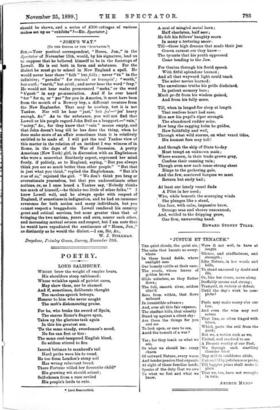"JOHN'S WAY."
[TO THE EDITOR OP THE "SPECTATOR."] SIR,—Your poetical correspondent, "Hosea, Jun.," in the Spectator of November 11th, would, by his signature, lead us to suppose that he believed himself to be in the footsteps of Lowell. He is out both in form and substance. For the dialect he must go to school in New England a spell. He would never hear there " folk " but folks ; never " tn" in the infinitive; " paradin' " for trainie or trample ; "worth," but smith; "earth," but airth ; and never hear the word "fray." He would not bear makes pronounced " meks," or the word " b'gosh " in any pronunciation. And if he ever heard " ter " for to, or " yer " for you in America, it must have been from the mouth of a Bowery boy, a different creature from the New Englander. That may be cowboy, but it is not Yankee. Nor will he hear "just,' but jes.—" jes' heavy enough, &c." As to the substance, you will not find that Lowell or his people regard John Bull as a braggart,—" vain," "noisy," &c., for they know that "vain" means empty, and that John doesn't brag till be has done the thing, when he does make more of an affair sometimes than it is relatively entitled to be made of. I will put the real Yankee view of this matter in the relation of an incident I was witness of in Rome, in the days of the War of Secession. A pretty American (New York) girl, in discussion with an Englishman who wore a somewhat Southerly aspect, expressed her mind freely, if politely, as to England, saying, "But you always think you are so much better than other people." "But that is just what you think," replied the Englishman. "But it's true of us," rejoined the girl. "We don't think you brag or overestimate yourselves, but that you underestimate other nations, or, as I once heard a Yankee say, 'Nobody thinks too much of himself,—he thinks too little of other folks.'" I knew Lowell well, and he always spoke with respect of England, if sometimes in indignation, and he had an immense reverence for both nation and many individuals, but you cannot respect a braggadocio. Lowell rendered his country great and critical services, but none greater than that of bringing the two nations, yours and ours, nearer each other, and increasing mutual esteem and respect, but I am sure that he would have repudiated the sentiments of "Hosea, Jun.," as distinctly as he would the dialect.—I am, Sir, &c.,










































 Previous page
Previous page